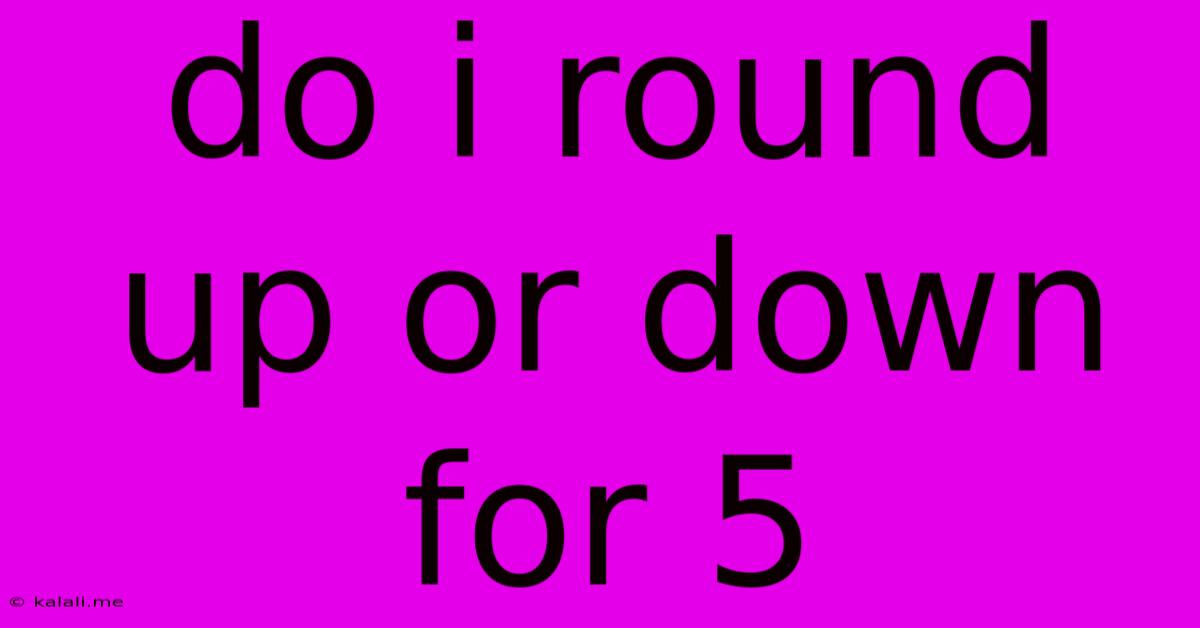Do I Round Up Or Down For 5
Kalali
May 20, 2025 · 3 min read

Table of Contents
Do I Round Up or Down for 5? The Definitive Guide
Rounding numbers is a fundamental mathematical skill, crucial for everything from everyday calculations to complex scientific analysis. But one question frequently stumps people: what happens when you encounter a 5? Do you round up or down? The answer isn't as simple as you might think, and depends on the specific rounding method used. This guide will clarify the different approaches and help you choose the best method for your situation.
This article will explore various rounding methods, focusing on how to handle the number 5, and provide clear examples to illustrate each approach. We'll cover banker's rounding, standard rounding, and discuss situations where consistency is paramount.
Understanding Different Rounding Methods
Several methods exist for rounding numbers, each with its own rules for dealing with the number 5. The most common are:
1. Standard Rounding (Round Half Up): This is the most widely taught method. If the digit following the rounding digit is 5 or greater, round up. If it's less than 5, round down.
- Example:
- 2.5 rounds up to 3
- 2.4 rounds down to 2
- 17.5 rounds up to 18
- 17.4 rounds down to 17
This method is simple to understand and apply, making it popular for everyday use. However, it introduces a slight bias towards rounding up, as all 5s are rounded up.
2. Banker's Rounding (Round Half to Even): Also known as "round half to even" or "statistician's rounding," this method aims to reduce bias by rounding to the nearest even number.
- Example:
- 2.5 rounds to 2 (even)
- 3.5 rounds to 4 (even)
- 17.5 rounds to 18 (even)
- 17.4 rounds down to 17
- 18.5 rounds to 18 (even)
Banker's rounding is frequently preferred in situations where eliminating bias is crucial, such as statistical analysis or financial calculations. It ensures that rounding errors are evenly distributed, leading to more accurate results over many calculations.
3. Round Half Down: This is less common but sometimes used. If the digit following the rounding digit is 5, round down. Otherwise, follow standard rounding rules.
- Example:
- 2.5 rounds down to 2
- 2.6 rounds up to 3
This method introduces a bias towards rounding down.
Choosing the Right Rounding Method
The optimal rounding method depends entirely on the context.
-
Everyday Calculations: Standard rounding is usually sufficient for everyday tasks where a small bias is acceptable. Its simplicity makes it easy to understand and apply.
-
Statistical Analysis & Finance: Banker's rounding is generally preferred in these fields due to its bias-reducing properties. Consistency and accuracy are paramount in these contexts.
-
Programming: Programming languages often have built-in rounding functions that adhere to specific rounding methods. It's crucial to understand the method used by your programming language to avoid unexpected results.
Consistency is Key
Regardless of the method you choose, consistency is essential. Applying the same rounding method throughout your calculations ensures accuracy and avoids introducing inconsistencies that can lead to errors. Inconsistency can lead to significant inaccuracies in complex calculations.
In conclusion, there's no single "right" answer to whether you round up or down for 5. The best approach depends on the specific context and the desired level of accuracy. Understanding the different rounding methods and their implications will help you make informed decisions and ensure the accuracy of your calculations. Choose a method, stick to it, and your results will be more reliable.
Latest Posts
Latest Posts
-
Ford Focus Engine Malfunction Service Now Loss Of Power
May 21, 2025
-
What Is A Series In Tv
May 21, 2025
-
Why Is A Raven Like A Writing Desk Answer
May 21, 2025
-
What Goes Down A Chimney Up
May 21, 2025
-
How To Address Many People In An Email
May 21, 2025
Related Post
Thank you for visiting our website which covers about Do I Round Up Or Down For 5 . We hope the information provided has been useful to you. Feel free to contact us if you have any questions or need further assistance. See you next time and don't miss to bookmark.